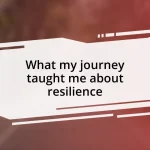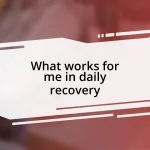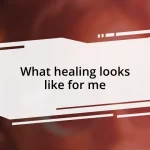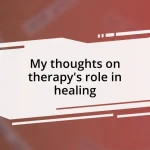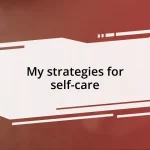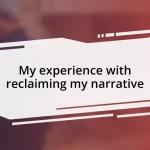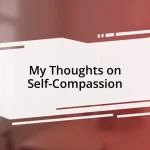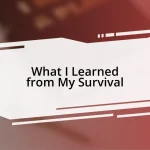Key takeaways:
- Trauma affects mental, physical, emotional, and social well-being, requiring personalized recognition of triggers and coping mechanisms.
- Developing coping strategies, such as mindfulness, journaling, and seeking support, can facilitate healing and clarity.
- Building a supportive social network and seeking professional help are crucial components of the recovery journey.
- Creating a long-term healing plan with specific goals and regular self-reflection aids in tracking progress and fostering resilience.
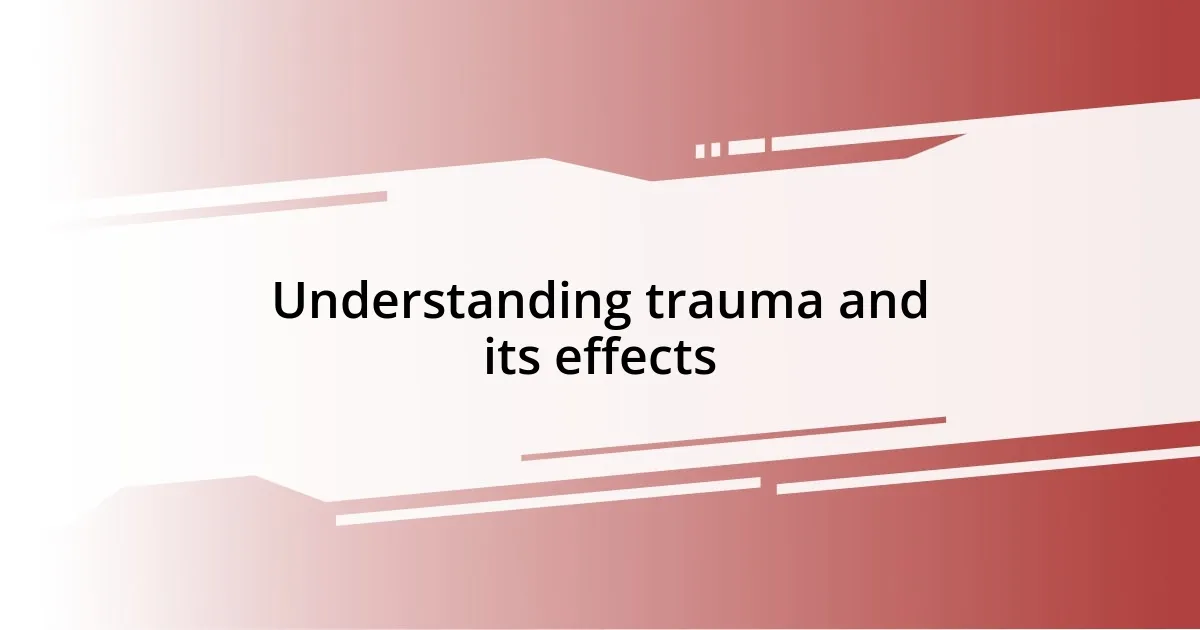
Understanding trauma and its effects
Trauma can often feel like an invisible weight that shapes our thoughts and reactions, sometimes without us even realizing it. When I experienced a traumatic event, I found myself constantly on edge, as if my body had pressed a hidden alarm button. Have you ever felt a similar heightened state of awareness, where even the smallest noise sent your heart racing? That’s a common response, rooted in our brain’s natural fight-or-flight mechanisms.
The effects of trauma can ripple through various aspects of our lives. I distinctly remember how my ability to enjoy simple moments, like going for a walk, diminished. Each step felt heavy, loaded with memories I didn’t know how to process. These experiences highlight how trauma doesn’t just affect our mental state; it manifests physically, emotionally, and socially too. It’s not just about pain; it’s also about how we learn to navigate the world around us.
Moreover, understanding that trauma isn’t a one-size-fits-all experience is crucial. Some people may respond with anger or withdrawal, while others might become excessively caring, trying to shield themselves from future harm. In my experience, knowing that my reactions were part of a broader psychological response helped me feel less isolated. Have you ever wondered how your coping mechanisms were shaped by your experiences? Recognizing these patterns can be the first step towards healing, as it allows us to unpack our reactions with compassion.
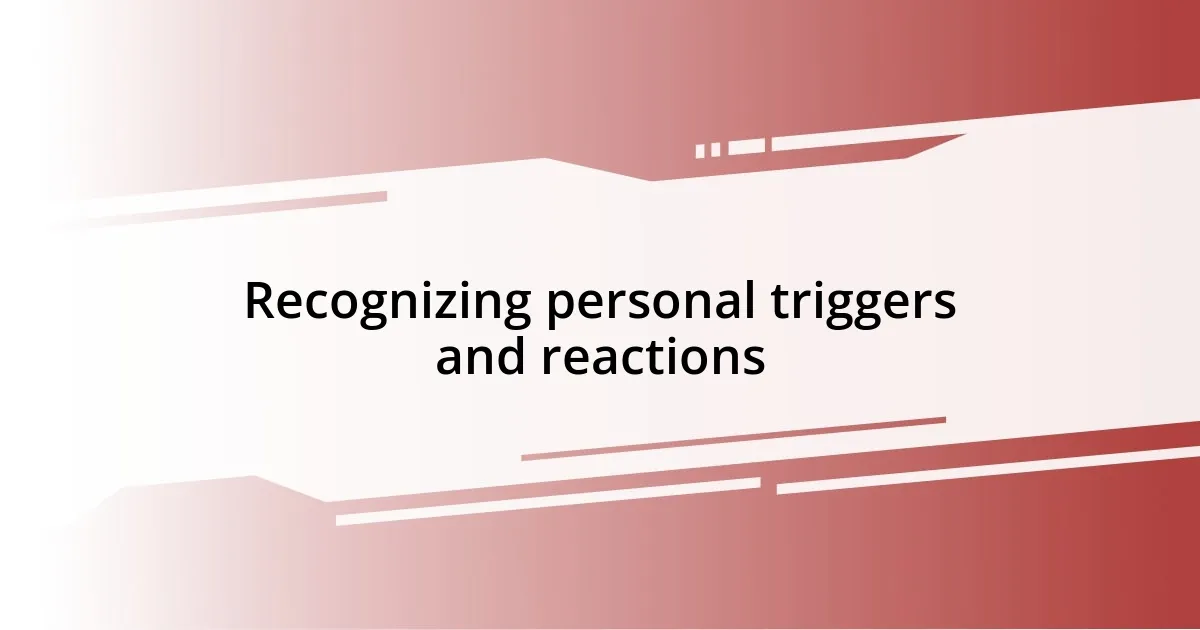
Recognizing personal triggers and reactions
Recognizing personal triggers and reactions is a vital step in understanding how trauma shapes our lives. I’ve often found myself feeling sudden waves of anxiety when I encounter certain smells or sounds associated with past experiences. It’s as if my brain is wired to respond automatically, pulling me back to those moments before I even realize what’s happening. The intensity of these reactions can be confusing and sometimes even overwhelming, making it essential for me to pinpoint what triggers them and why.
Here are some common triggers you might relate to:
- Certain places: A location might remind you of a traumatic event.
- Sounds: Loud noises or specific music can evoke strong emotional responses.
- Social situations: Interactions with certain people may bring back painful memories.
- Smells: Fragrances linked to past experiences can instantly evoke vivid emotions.
- Dates and anniversaries: Specific days might carry emotional weight based on past events.
By paying attention to these details, I can better prepare myself and set boundaries to navigate my emotional landscape. While identifying these triggers can be challenging, each step forward is a victory in my healing journey.
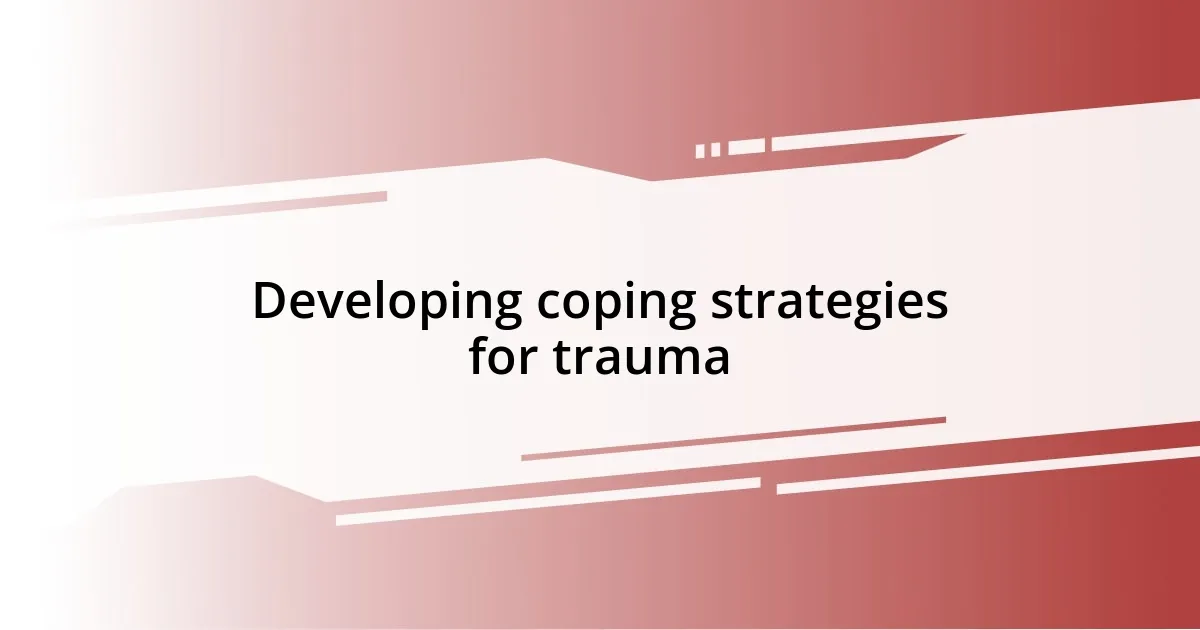
Developing coping strategies for trauma
Developing coping strategies for trauma can feel like piecing together a puzzle, where every piece represents a unique aspect of my healing journey. I often find solace in mindfulness practices, like meditation, which help anchor me in the present. It’s remarkable how just a few deep breaths can lift some weight off my shoulders, allowing me to step back from overwhelming emotions. Have you ever noticed how grounding techniques can provide a moment of clarity amid the chaos?
As I explored different coping strategies, journaling emerged as a transformative outlet for my thoughts and feelings. Writing about my experiences not only helps disentangle my emotions but also creates a narrative that I can revisit. It’s almost like having a conversation with my past self, where I can reflect on how far I’ve come. It’s curious how the act of writing can turn a chaotic mind into a calmer one, isn’t it?
Another coping method that’s made a difference for me is seeking support from others. Sharing my feelings with trusted friends or a therapist has opened doors to deeper understanding and healing. I remember a time when simply expressing my struggles allowed me to feel less burdened, almost as if their empathy lifted a corner of that invisible weight. Have you sought out support, and how has it impacted your path to healing?
| Coping Strategy | Description |
|---|---|
| Mindfulness | Practices such as meditation help in grounding oneself, promoting a sense of calm and awareness in stressful moments. |
| Journaling | Writing about experiences and emotions provides clarity and a space for reflection, helping to organize chaotic thoughts. |
| Support Networks | Connecting with friends or a therapist fosters understanding and support, lessening the emotional burden of trauma. |
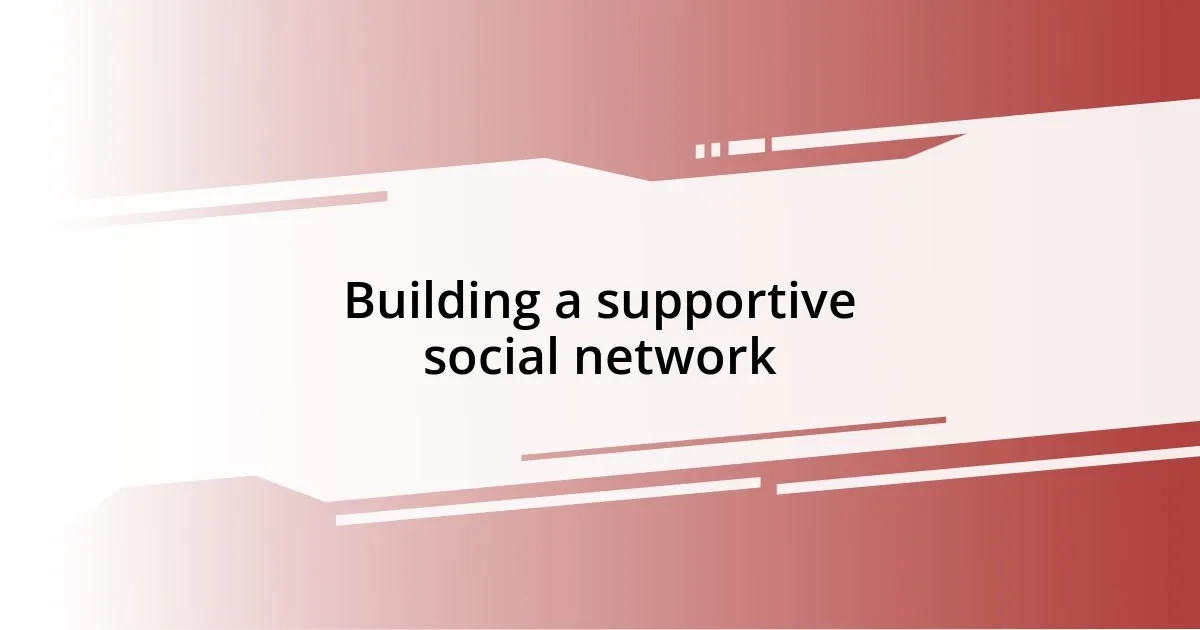
Building a supportive social network
Building a supportive social network is crucial when navigating trauma. I’ve noticed that surrounding myself with understanding friends can make a world of difference. It’s fascinating how a simple text or a chat over coffee with someone who truly listens can create a cocoon of safety, allowing me to express my feelings without judgment. Have you experienced that comforting connection with someone?
There was a time when I felt isolated in my struggles, thinking I had to face everything alone. I reached out to a few close friends, and I was struck by their willingness to support me. Just sharing my story made me feel lighter. It’s interesting how vulnerability can strengthen relationships—by allowing others in, I found not just empathy but also shared experiences that deepened our bonds.
Moreover, engaging in community groups has been an eye-opener for me. When I joined a support circle focused on trauma, I realized the power of collective healing. We shared our stories and listened to each other, fostering an environment of mutual understanding. Have you considered seeking out such communities? Being part of a group that validates your experiences can remind you that you’re not alone in this journey. It’s remarkable how support networks can transform feelings of isolation into a shared sense of hope and healing.
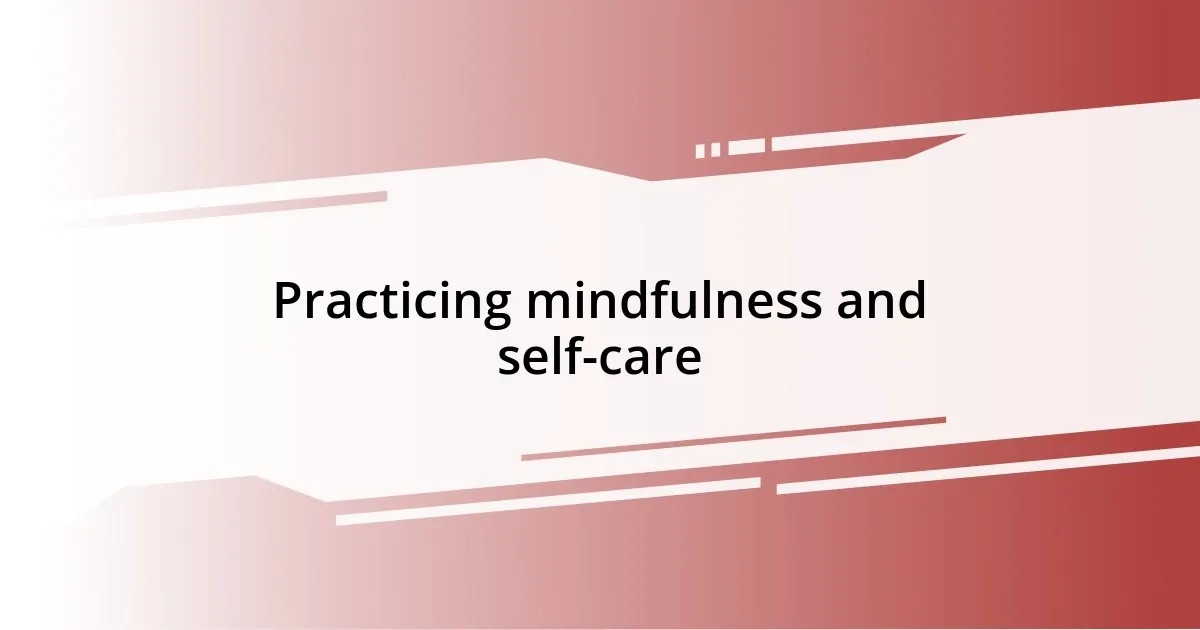
Practicing mindfulness and self-care
Practicing mindfulness and self-care has been invaluable in my journey through trauma. I remember the first time I sat down for a meditation session—it felt foreign and uncomfortable. Yet, as I focused on my breath, a wave of calm washed over me. It’s amazing how simply being present can shift my entire perspective. Have you ever tried just sitting in silence, allowing your thoughts to come and go like passing clouds?
Self-care varies for everyone, and I found my rhythm through consistent routines. On days when my emotions run high, taking time for a warm bath or a nature walk provides me with a needed reset. I think of these moments as little retreats, where I can recharge and reconnect with myself. What have you found helpful in carving out your own moments of self-care?
I also believe that incorporating mindfulness into daily activities transforms mundane tasks into grounding experiences. Whether it’s savoring each bite of my meals or being fully aware during my daily commute, I strive to find those little bursts of awareness. It’s surprising how much clarity I gain when I commit to being present. Have you noticed how small shifts in your consciousness can lead to significant changes in how you experience life?

Seeking professional help when needed
Seeking professional help can be a pivotal step in the recovery journey. I remember the first time I walked into a therapist’s office—my heart raced, but the instant I sat down, I felt an unexpected sense of relief. It was a space where I could share my thoughts without fear of judgment. Have you ever wondered how it might feel to have a trained listener dedicated to your well-being?
There was a period of time when I struggled with feelings that seemed too heavy to bear alone. After some soul-searching, I decided to seek therapy. The experience was enlightening; my therapist guided me to unveil layers of my trauma that I hadn’t fully acknowledged. Through our conversations, I gained clarity about my emotions and learned coping strategies that have since enriched my life. How often do you think about the benefits of having a professional to guide you through tough times?
Moreover, I’ve come to realize that therapy isn’t just about uncovering problems; it’s also a means of empowerment. Each session felt like a step toward taking control of my narrative. Sometimes, discussing what troubles you with someone who knows how to navigate those waters can illuminate paths you didn’t even know existed. Have you considered how a professional might help you see beyond your current struggles?
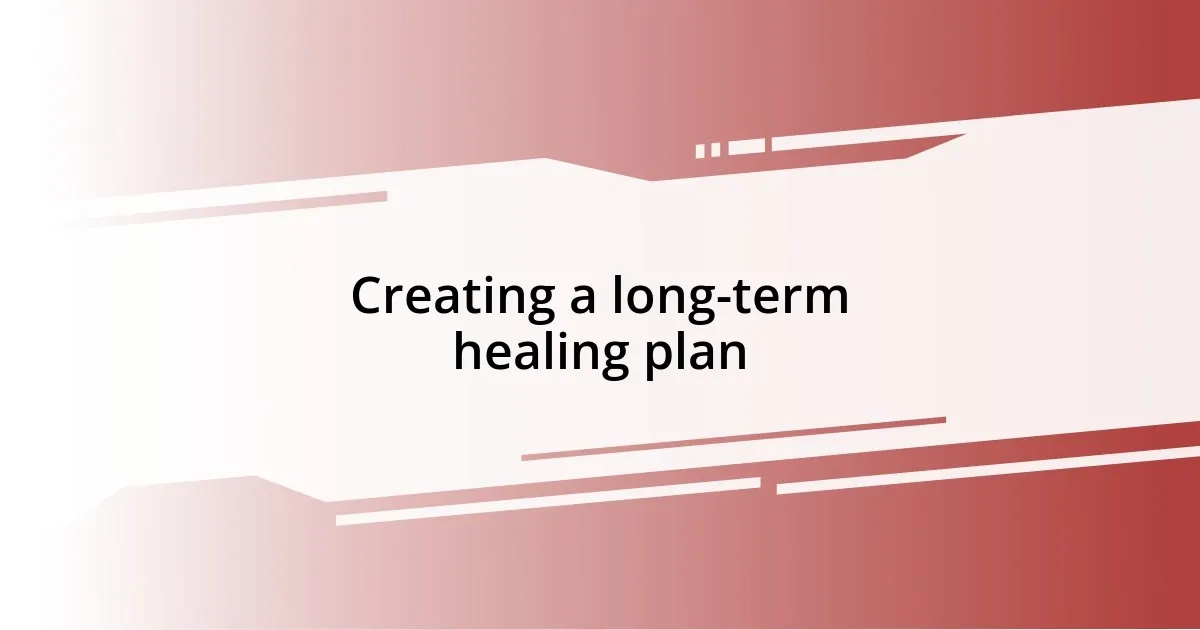
Creating a long-term healing plan
Creating a long-term healing plan involves establishing clear goals and milestones to help you track your progress. When I mapped out my own healing journey, I initially felt overwhelmed, unsure of where to begin. I started by breaking it down into smaller, manageable steps, like setting aside time each week for reflection. Have you ever experienced that sense of clarity when you make your goals specific?
One essential aspect of my plan was to regularly check in with myself and reassess my needs. I remember journaling about my feelings every Sunday afternoon; it became a ritual that provided insight into my emotional state. This practice not only helped me identify patterns but also gave me a sense of accomplishment as I could witness my growth. How often do you pause to reflect on your feelings and adjust your approach accordingly?
It’s also crucial to build a supportive network as part of a long-term healing plan. I found that surrounding myself with people who genuinely understood my struggles made a significant difference. Whether it’s friends, family, or support groups, having a circle of compassionate listeners can be a game-changer. Have you thought about who you can lean on during your healing journey?
